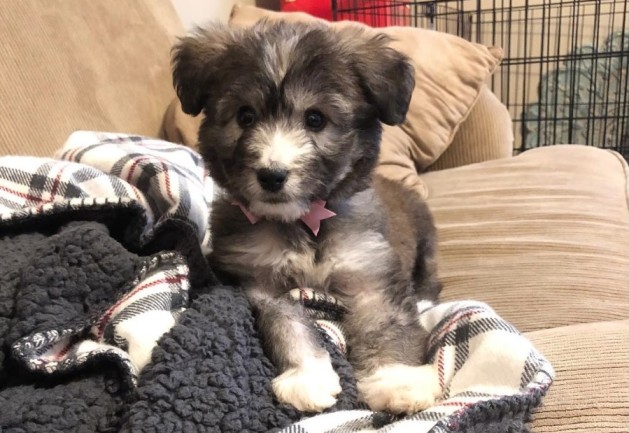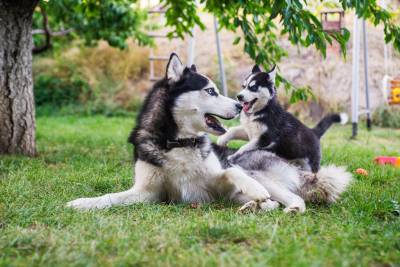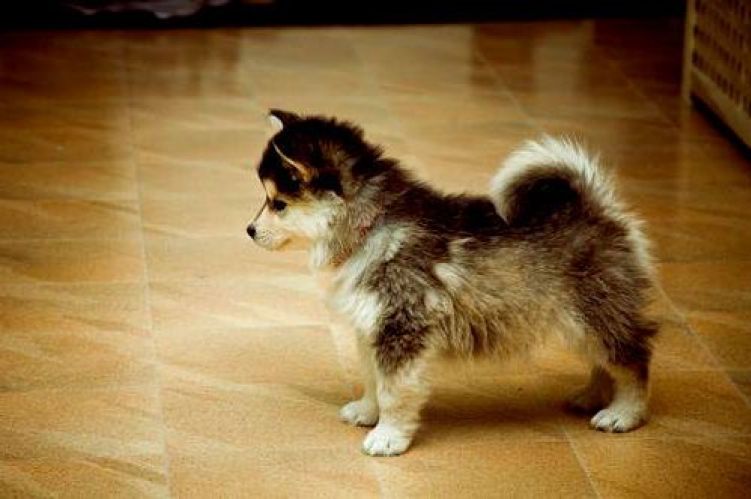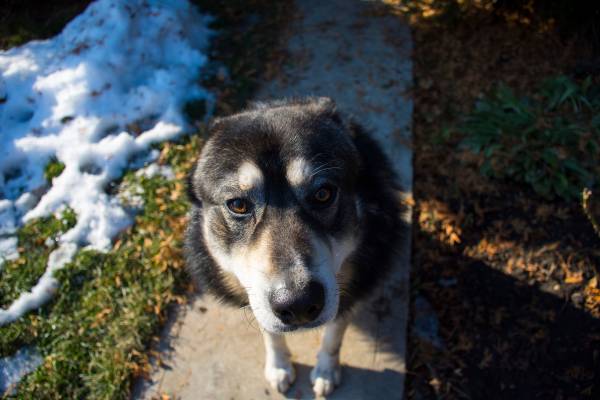Connect with a verified veterinarian in minutes. Licensed vets are available 24/7 to answer your questions. No need to worry about your furry family member.
Have you ever heard of a Husky Poodle mix? If not, you’re not alone! This was a new one for us, too! But can you imagine what this type of pooch would be like? You know it’s going to be highly intelligent—that’s a given. But what else can you expect from a Husky Poodle mix?
We’ve put together some information on the Husky Poodle mixed dog. Here, you’ll find all the basics you need to know if you’re considering adopting one of these amazing dogs!
What is a Poodle Husky Mix?
You’ve probably guessed that this is a mix between a purebred Siberian Husky and a purebred Poodle. The result is a crossbreed dog called a Husky Poodle, one that is very sweet, happy and affectionate. You’ll have a best bud—we promise!
You may here Husky Poodles also called:
- Huskypoo
- Poosky
- Siberpoo
- Huskydoodle (this one’s our favorite!)
- Siberian Poodle
The parent breeds of the Husky Poodle mix are the Siberian Husky and the Poodle. These two breeds are known for their extreme work ethic and their sweet personalities. The Husky Poodle mix is a result of breeding two of these dogs together.
The Husky Poodle mix is a very versatile dog. He is happy and playful, but also loyal and protective. He is a great choice for families with children, as he is gentle and well-behaved. The Husky Poodle mix is also good for people who live in cold climates, as he has a thick coat that will keep him warm.
The undercoat of the Husky Poodle mix is very dense, which helps to keep him warm in cold weather. The Husky Poodle mix also has a thick coat on his head, neck, and tail. This coat is easy to care for and will stay clean and shiny.
The Husky Poodle mix is a great choice for anyone who is looking for a sweet, loyal dog that is also very versatile. He is perfect for families with children and people who live in cold climates. This mixed breed is very popular and there is a good chance that you will be able to find a puppy or dog for sale that is compatible with your lifestyle.
The lifespan of the Husky Poodle mix is typically around 10 to 13 years. The standard Poodle parent breed has a lifespan of around 12 to 15 years.
These dogs are highly affectionate, funny, and highly active. In fact, they can be somewhat hyperactive. Some Huskydoodles can also be aggressive, with some even becoming destructive when they’re frustrated or bored. A Huskydoodle does best with a pet parent who is experienced with dogs that are somewhat stubborn and difficult to handle.
However, if you adopt a Huskydoodle, you’ll have a loyal friend for years.
Connection With Poodle
Poodles are designer dogs, bred over centuries for various purposes, including hunting waterfowl. The breed is versatile and can be used for obedience, Agility, flyball, schutzhund and herding events. Huskies are a working dog breed and come in different sizes and colors. They were originally bred in the arctic regions of North America to pull sleds.
Poodles are originated from Germany, while Huskies come from Alaska. The Husky Poodle mix is a crossbreed between these two breeds and is a very sweet, happy and affectionate dog.

Review symptoms, medications & behavior to keep your pets healthy with a Vet Online in just minutes.
Ask a Vet Live NowPersonality & Characteristics of a Huskydoodle
Husky Poodle mixes, just like other cross-bred dogs, each are a unique combination of their parents. Each dog, even from the same litter, will have their own personality, coloring, temperament and more. Each dog is unique and beautiful. You can expect these dogs to be highly intelligent and alert, and they have extremely energetic! Your fur baby will need plenty of exercise and stimulation to keep him physically and mentally healthy, as well as happy.
You may be wondering what a Huskydoodle’s fur is like. It really depends on the dog’s parents. Husky Poodle mixes tend to have thick, double layered fur, which makes them look a bit fluffy and shaggy. If the dog has more Poodle genetics, then he may have curly fur, that is non-shedding or low-shedding. This type of dog (more like the Poodle) is considered hypoallergenic. When it comes to their coat color, Huskydoodles come in a wide range of colors and color combinations. These dogs usually weight between 45-60 lbs and stand from 13 to 22 inches tall. When it comes to eye color, a Huskydoodle may have more Husky type coloring, which can mean blue eyes, or they may be brown, like their Poodle ancestors.
One more thing to know about these dogs is that they can sometimes be stubborn, unruly, and difficult to handle. Huskydoodles can also be somewhat needy and clingy at times. They usually love to train and are also good with people they don’t know. While they can be great dogs for families with older kids, it’s recommended that you not adopt one of these dogs if you have small children at home.
It’s also important to know that Huskydoodles also tend to be loyal to their family and to form strong bonds with one person. When it comes to training, you’ll need to be patient as a Huskydoodle can be challenging to train. One of the best methods to use when training this type of dog is to make everything a game. Socialization can also be a challenge with a Huskydoodle. The reason is that these dogs can be wary of strangers. For this reason, a Huskydoodle puppy should be socialized from a young age to become comfortable with strangers, etc.
Dog owners who have Huskydoodles usually say that these dogs are amazing and truly are one of a kind. They are loyal, loving, and have a lot of energy. Some people also say that they can be difficult to train, but with the right owner, these dogs can be great companions and family pets.
Huskydoodle Health & Care
Husky Poodle mixes generally live between 10-13 years. As with other types of crossbred dogs, Husky Poodle mixes generally have good health; however, they are prone to certain health conditions including:
- Elbow & hip dysplasia
- Food allergies, intolerance & sensitivities
- Bloat
- Basal cell tumor
- Epilepsy
- Hypothyroidism
- Kidney problems
- Patellar luxation
- Progressive retinal atrophy
- Skin problems (irritated skin, rashes, etc.)
- Separation anxiety
Common health problems that are associated with Husky Poodle mixes are not exclusive to this type of dog, but they are more common in these dogs. It is important to keep your Husky Poodle mix healthy by providing them with a balanced diet, regular exercise and veterinary care when needed.
Huskies are large dogs, and as such, they require a lot of food. A Husky Poodle mix will need about the same amount of food as a purebred Husky, but you may want to feed them smaller portions more often in order to avoid overeating. Make sure that their food is high in fiber so that they don’t get too fat.
Also, mental stimulation is important for all dogs, but is especially important for Husky Poodle mixes. These dogs are high energy and need plenty of mental and physical stimulation to keep them mentally and physically healthy.
Your fur baby will need at least a one hour walk each day, which will keep him happy, healthy and keep him from becoming bored. However, it’s highly recommended that your take your dog out for at least a one hour walk twice a day.
If a Huskydoodle doesn’t get enough exercise, they can easily become bored, which leads many dogs to becoming destructive. Plenty of exercise and love will help you avoid these issues. Your Huskydoodle will need quite a bit of brushing on a regular basis, and they may even need a haircut every now and then. However, you’ll want to brush them almost every day in order to avoid tangles and snarls.
Matting is also a common issue with Huskydoodles. This is due to their thick fur, which can become matted if they’re not given enough time to properly dry after being wet. You can help prevent matting by giving your Huskydoodle a good brushing before they go outside, and then making sure they’re completely dry before putting them in their crate or bed at night.
Again, giving them enough playtime is also important. Huskydoodles are active dogs, and they need plenty of room to run and play. You can provide this by having a large yard for them to play in, or by providing them with a toy that they can chew on.
All in all, a Husky Poodle is a great dog to have—they’re sweet, affectionate and very active. Just be sure to give them the exercise and attention they need, and you’ll have the perfect friend for life!
When it comes to bathing, your canine companion will need a bath at least once a month. Unless they become very dirty and smell, Huskydoodles don’t need to be bathed more often. This is because frequent bathing can remove protective oil from their skin, making them more prone to skin irritations.
Huskydoodle Diet
When it comes to diet, you’ll need food that’s made for a medium or large-breed dog that has high energy requirements, like the Huskydoodle. Your fur baby will need a diet rich in protein to keep his muscles and immune system strong and healthy. In addition, his dog food should contain Omega-3, DHA and EPA fatty acids to keep him from developing skin problems.
Keep in mind that they do have a tendency to gain weight, so you may want to feed them on a schedule, rather than leaving food in their bowl all day long. Give them dog food in the morning, afternoon and evening, and make sure they’re getting enough water as well.
A kibble that’s made specifically for Huskydoodles is a good option, as they tend to have a high-quality diet. However, you can also give them any type of dog food that meets their nutritional needs.
How to Groom a Husky Poodle Mix
If you have a Husky Poodle mix, you’ll want to keep them groomed on a regular basis. Huskies shed a lot, so your dog will need to be brushed at least once a week. You’ll also want to trim their hair down to about an inch long, and you can do this with a regular dog clipper. Huskies also have a thick coat, so you may need to use a brush as well. You should also check for any mats or tangles, and if necessary, brush them out. Finally, give your dog a bath every few months, using a gentle dog shampoo.
Purebred dogs typically have shorter hair than their mixed breed counterparts, but this doesn’t mean that your Husky Poodle will have short hair. The average Huskydoodle will have a moderate amount of hair, and it will be easy to brush. If you have a Husky Poodle mix, be sure to brush their hair regularly to avoid tangles and knots.
Taking them to a groomer every few months will help keep their hair looking its best. If you don’t have the time or inclination to do this, you can use a hair brush and a good dog shampoo.
Do Huskydoodles Make Good Family Dogs?
The Husky parent is a hardy and active dog, while the Poodle parent is a smart and gentle dog. As a result, the Huskydoodle is usually friendly and loving, but can be protective if needed.
Caution is recommended if you have young children at home. The reason is because these dogs are not always patient or tolerant of being tugged, poked, etc. They also don’t deal well with sudden noises, surprises and more.
If you have small children at home, you might consider a different dog breed that is more friendly with small children. Some destructive behaviors in Huskydoodles can be corrected with obedience training.
However, if you have older children who are more respectful of rules and boundaries, a Huskydoodle may be a great choice for you. They are smart dogs and usually good with other dogs and cats, and they are usually quite gentle with people.
The exercise requirements for a Huskydoodle are about the same as for any other dog. They need at least an hour of exercise each day, but they can also be active indoors if you provide them with a large enough space to run and play. This hybrid dog’s high energy levels can be calmed with plenty of exercise and a loving home.
Breeders of Huskydoodle mixes are always looking for homes for their dogs, as they are considered a popular breed. However, due to the high demand for these dogs, it is important to do your research before adopting one. There are many Huskydoodle mix breeders out there, so it’s best to ask around or check online for reputable breeders.
Tips to Adopt a Husky Poodle Mix
If you’re thinking about adopting a Husky Poodle mix, here are a few tips to keep in mind:
1. Do your research.
Before you bring your new dog home, make sure to do some research on the breed. You don’t want to adopt a dog that is going to be difficult to care for.
2. Make sure your home is ready for a dog.
If you have small children or other pets, make sure your home is ready for a dog before you adopt one. Huskies are very active and need plenty of exercise.
3. Be prepared to spend time training your new dog.
A Husky Poodle mix is a very active breed, and they will need plenty of training in order to be obedient. If you’re not prepared to train your dog, adoption may not be the best option for you.
4. Be prepared to have your dog visit the vet regularly.
Huskies are prone to health issues, and they will need to be seen by the vet on a regular basis. This is especially important if your dog is older or has any health issues.
5. Be prepared to spend a lot of money on your new dog.
Huskies are a high-energy breed, and they will require a lot of expensive toys, food, and other supplies. Make sure you have enough money set aside before you adopt a Husky Poodle mix.
6. Be prepared to be patient.
Huskies are a very active breed, and they may require a little bit of patience on your part. They may also require some training, but be prepared to stick with it.
A Toy Poodle and a Siberian Husky Mix will make a great family pet. They are loyal, loving and playful. Huskydoodles are also very active and need plenty of exercise, so you’ll want to make sure they have plenty of room to run and play. If you’re looking for a great dog that is both playful and active, a Husky Poodle is the perfect choice!
A Huskydoodle can be a wonderful loving companion for the right pet parent. These dogs are highly intelligent, have tons of energy and need someone who is used to dealing with dogs that can be difficult to handle. If you adopt a Husky Poodle mix, you’ll have a canine friend for years to come!
Connect with a verified veterinarian in minutes. Licensed vets are available 24/7 to answer your questions. No need to worry about your furry family member.

Julie
Julie is a graduate of the University of North Carolina, Wilmington, where she studied Animal science. Though contrary to the opinion of her parents she was meant to study pharmacy, but she was in love with animals especially cats. Julie currently works in an animal research institute (NGO) in California and loves spending quality time with her little cat. She has the passion for making research about animals, how they survive, their way of life among others and publishes it. Julie is also happily married with two kids.
Review symptoms, medications & behavior to keep your pets healthy with a Vet Online in just minutes.
Ask a Vet Live Now




